Cosmic Bard of the California Badlands
Shoutout to Joseph—hidden secret hero of my new book YUCK
“Even the trees are in misery.” —Werner Herzog
Scroll to the end for radio news, YUCK t-shirts & totes, and upcoming events.
I never would have written my new book YUCK, which came out last Wednesday, if I had not stumbled onto the brilliant forgotten work of Joseph Smeaton Chase, whose California Desert Trails (1919) is an unsung masterpiece of American literature and one of the greatest “Travel” books ever written.
YUCK is dedicated to this dead Englishman who captured the beauty and brutality of the Mojave and Colorado deserts in poetic brushstrokes still beaten by nobody in American letters—not even the late great masculine master of the desert west, Mr. Cormac McCarthy.
I’ve never spoken to or corresponded with any other living human who has read Joseph Smeaton Chase, and my knowledge of the abiding obscurity of his genius has long afforded me a secret pleasure.
How is it that one of the greatest books ever written about “Nature” or “Travel” is still totally unknown, out of print, impossible to find except in some shit edition printed off some guy’s computer in San Bernandino? It is an enigma analogous to that which I encountered over a decade ago with J.A. Baker, an author I wrote about at length back in September (“Pagan Vision for the Autumn Season”) and who rivals J.S. Chase as perhaps the most ecstatic, visionary, and underappreciated “Nature” writer of the 20th century.
How do artists of such daring vitality go on hidden? And when you’ve found them—should you respect their cultic slumber or set a blazing dumpster fire in the back alley to broadcast their brilliance?
I was tipped off to the works of J.S. Chase by an excellent and important essay by
, host of 90 Miles from Needles: The Desert Protection Podcast. A quote from J.S. Chase, featured in Clarke’s essay, set the ominous tone for the wedding Christina and I planned for April 2020 in Joshua Tree, California—a connubial ritual that was ultimately canceled three times by Covid and later never consummated.You can read briefly about this conjugal disaster and the backdrop that birthed YUCK in the book’s Preface… And if you must know, YUCK is also dedicated to the woman whose passion for the desert outstrips my own.
It was Christina who first brought me to Joshua Tree, and while much of YUCK concerns how blown up that town and park have become, I remain cheered by the enduring unpopularity of its greatest poet, Joseph Smeaton Chase. He is in himself a microcosm for the California desert, a vastness that remains on the whole ignored and unexplored, unknown and unimagined, dead and undreamt of to the hurrying swarm of humanity waiting in long air-conditioned lines to invade the National Park each Saturday.
And such obscurity gives me hope.
There is a tendency to assume we have unearthed all the good stuff, dissected and disenchanted this crowded corner of the continent, that every good mystery and mountain canyon must be mapped and cataloged, its ruins carted off, sorted and analyzed and posted online. It’s easy to fall into a habit of thinking that there is nothing new to discover and discuss except the next snafu barreling down the sewer-brown stream of our social media. But as I continue to find, whenever I dedicate my attention to the desert landscape, there is a wealth strangeness still sitting there.
And it was the abiding mystery that captured J.S. Chase, “the pale, grave face of the desert,” as he said, that “if once you look long upon it, takes you more subtly captive and keeps you enchained… as if you were bemused by the gaze of a sorceress, or had listened over long to some witching, monotonous strain; or had pondered too deeply on old legends of weirdry or parchments from tombs of strange, forgotten lands...” Chase goes on:
“I ask myself again, into what single impression does the desert render itself? …The answer must be, there is none. At every point the desert meets us with a negative. Like the Sphinx, there is no answer to its riddle. It is in the fascination of the unknowable, in the challenge of some old unbroken secret, that the charm of the desert consists. And the charm is undying, for the secret is—Secrecy.”
Yes, the Mojave Desert is ripe with secrets. It is a realm not of geology alone. There is something else here, alive, biding its time... And if you stare and listen too long, it may hold you captive, keep you bemused, obsessed, stranded until you finish a first, a second, and soon, I hope, a third book.
As I said last week at the release party for YUCK, I don’t know how I keep discovering such weird shit in the desert, or why it keeps finding me.
But in either case, I have a relationship with the Mojave. We are intimate. Entangled in some way. But this acquaintance, as Chase wrote, “Certainty it is not love, in any degree, that one feels for the desert… whatever it is, there is something of haunting in it.”
And as Chase concludes, it “is a haunting that lasts for life.”
Purchase the book or audiobook—narrated by me—on Amazon or Audible today and write a review.
Z107.7 FM, who “broadcast live from a vortex near Joshua Tree,” interviewed me on Monday. Look for that Friday. The radio segment on YUCK also mentions my reading and signing happening outside Joshua Tree at Hi Desert Times this Saturday, April 5th at 2:00 pm.
If you know anybody who’d be interested in discussing the strange, buried history of the Joshua Tree that YUCK uncovers, send them my way.
And finally, if you’re in a good mood and want to consume, I have some shirts and tote bags leftover from the book release party.
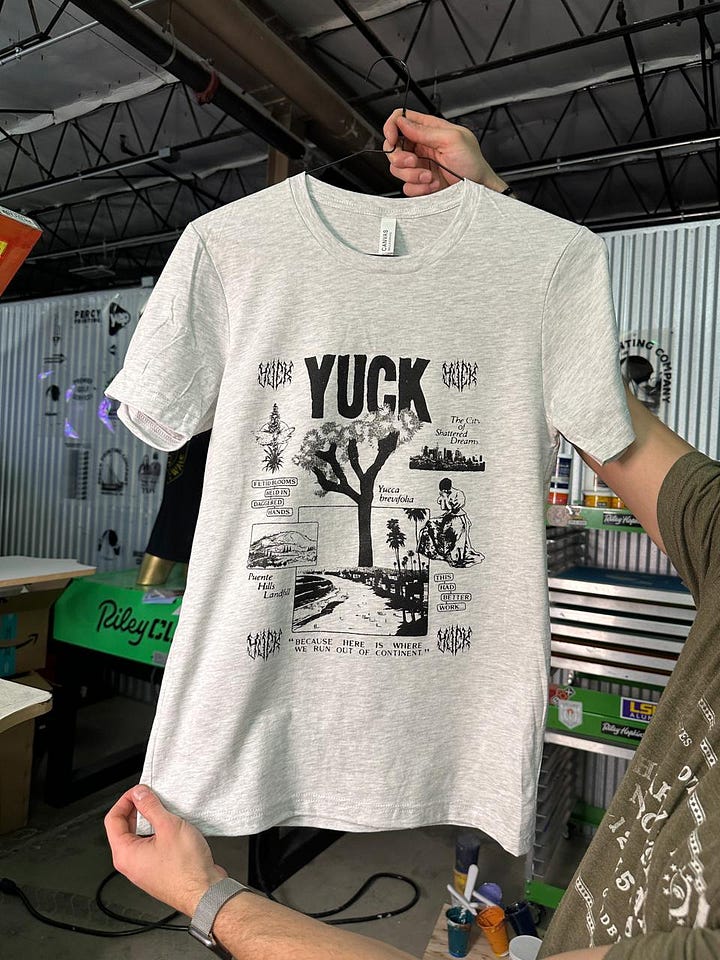
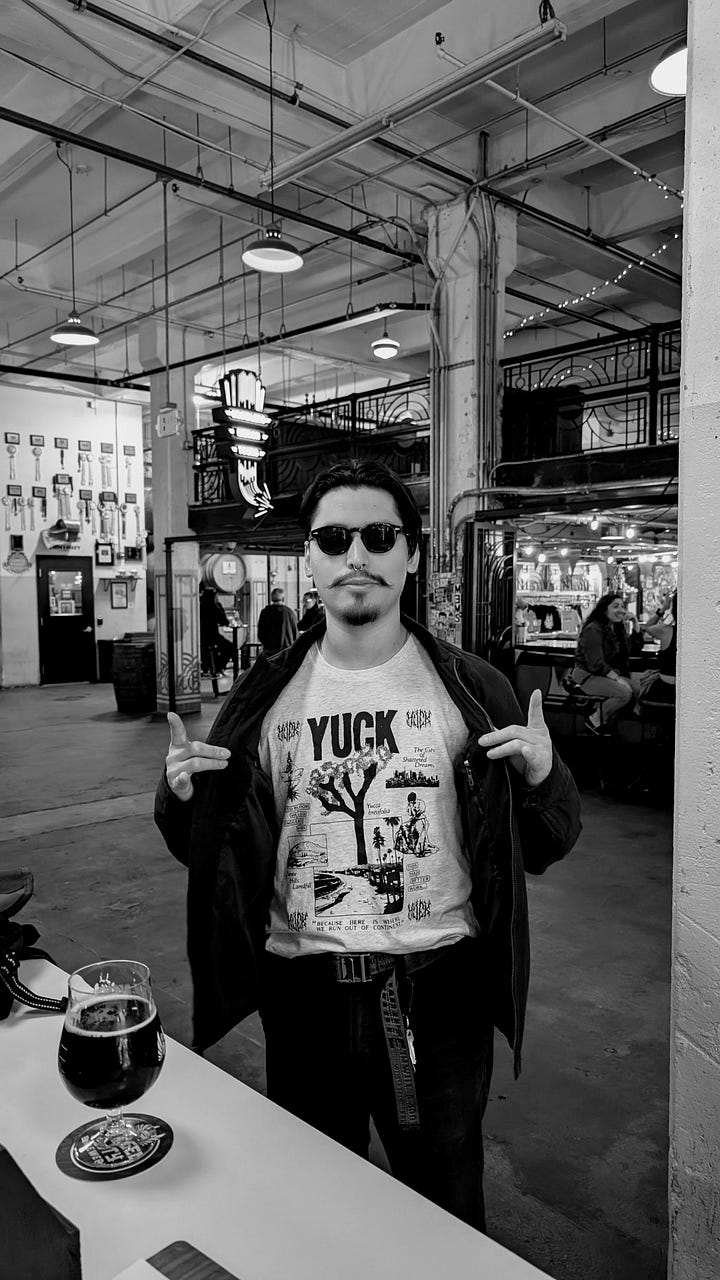
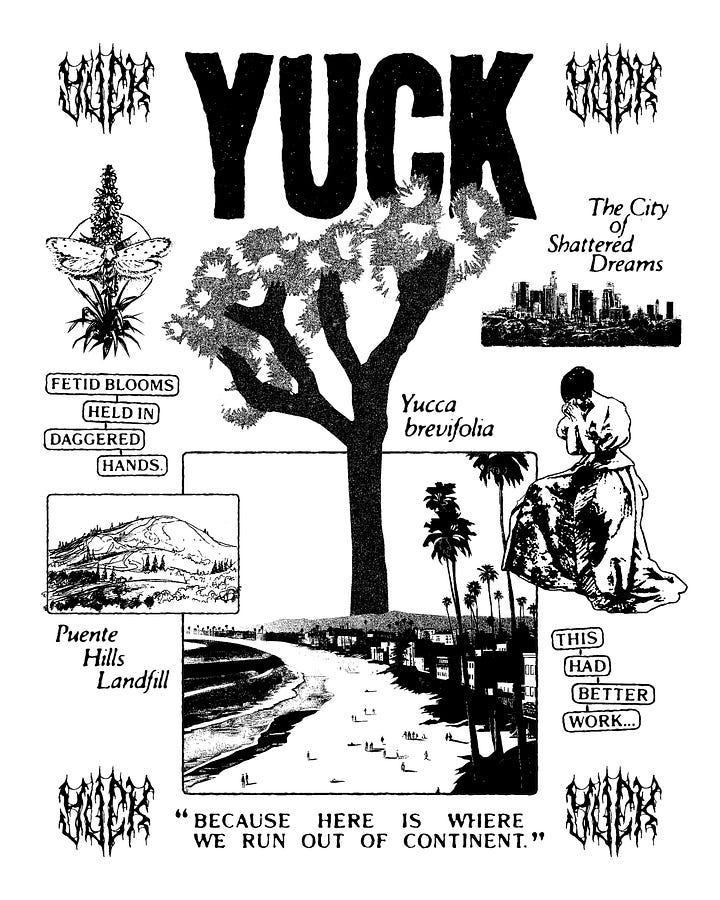
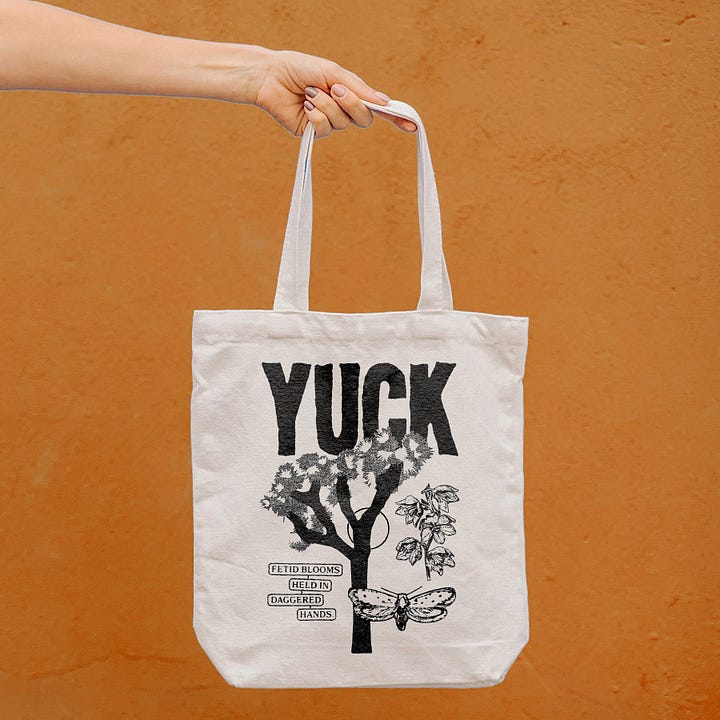
“Writing is about discovering things hitherto unseen. Otherwise there’s no point to the process.” —W.G. Sebald
Thinking of things seen and unseen… I mentioned Cormac McCarthy earlier and I’m reminded of the final note in YUCK—note #103—which occurs on the last page of the book, page 117:
103, We are waiting for you: have waited since eternity began: These spectacular lines are borrowed from the transcendent and vastly underappreciated visionary masterpiece frequently quoted throughout this text, a book that initiated much of this research in its passionate and disorienting depictions of the Joshua’s grotesquerie. What kind of author is crazy enough to claim that “A landscape filled with Joshua trees has a nightmare effect even in broad daylight: at the witching hour it can be almost infernal”? Even in broad daylight!? Joseph Smeaton Chase’s unrelenting California Desert Trails (1919) deserves a new edition from a reputable publisher with an inspired intro. I’m certain the book influenced many writers, even some of the best, particularly Cormac McCarthy. It is interesting to note that the latter’s Southwestern novels, despite the dark precision of their surrealistic prose painting, eschew any rendering of the desert’s most repulsive landscape prop, the Joshua Tree. The omissions is really quite weird. Yucca brevifolia is mentioned only once in an unremarkable phrase at the start of Blood Meridian. “All day they climbed through a highland park forested with joshua trees and rimmed about by bald granite peaks.”
How is it that in all the enviable, unfathomable cinematic montages and mind-blowing million-dollar landscape portraits Cormac McCarthy lofts across the 1,200+ pages of his western novels, he managed to mention the phrase “Joshua Tree” only once… and to do nothing with the image?
It makes me think of that impressive Vanity Fair essay that came out a few months ago—one of the biggest literary scoops in recent years—written by
, wherein the author mentions, by way of McCarthy’s former lover, that McCarthy, author of All the Pretty Horses, never actually once rode a horse.Apparently, he also never took a good look at a Joshua Tree.
I hope after reading YUCK you won’t ever look at a Joshua Tree the same.





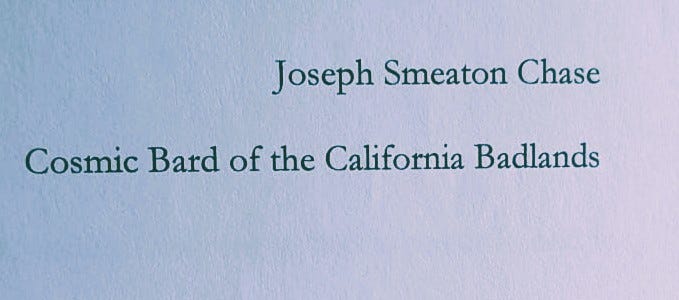
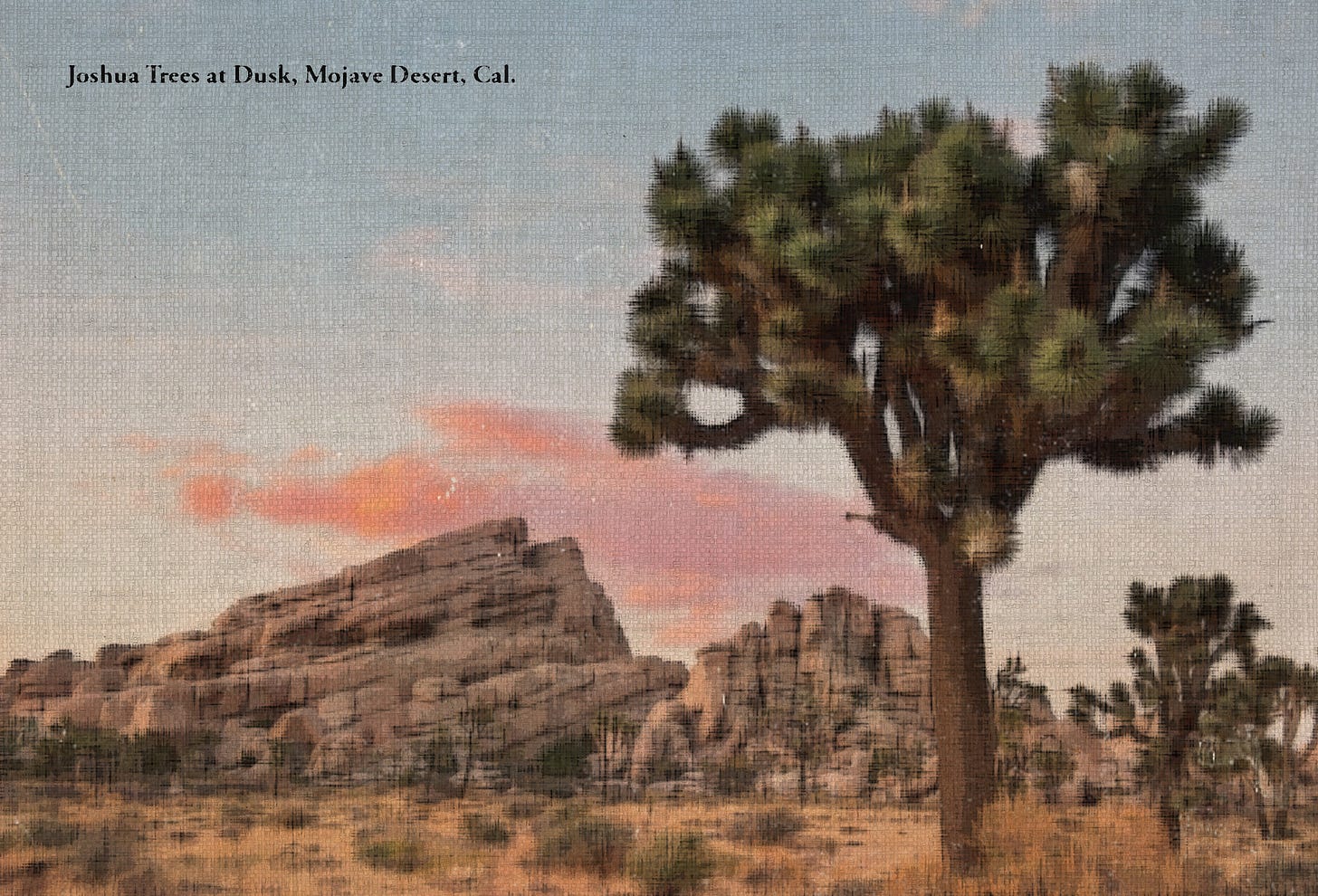




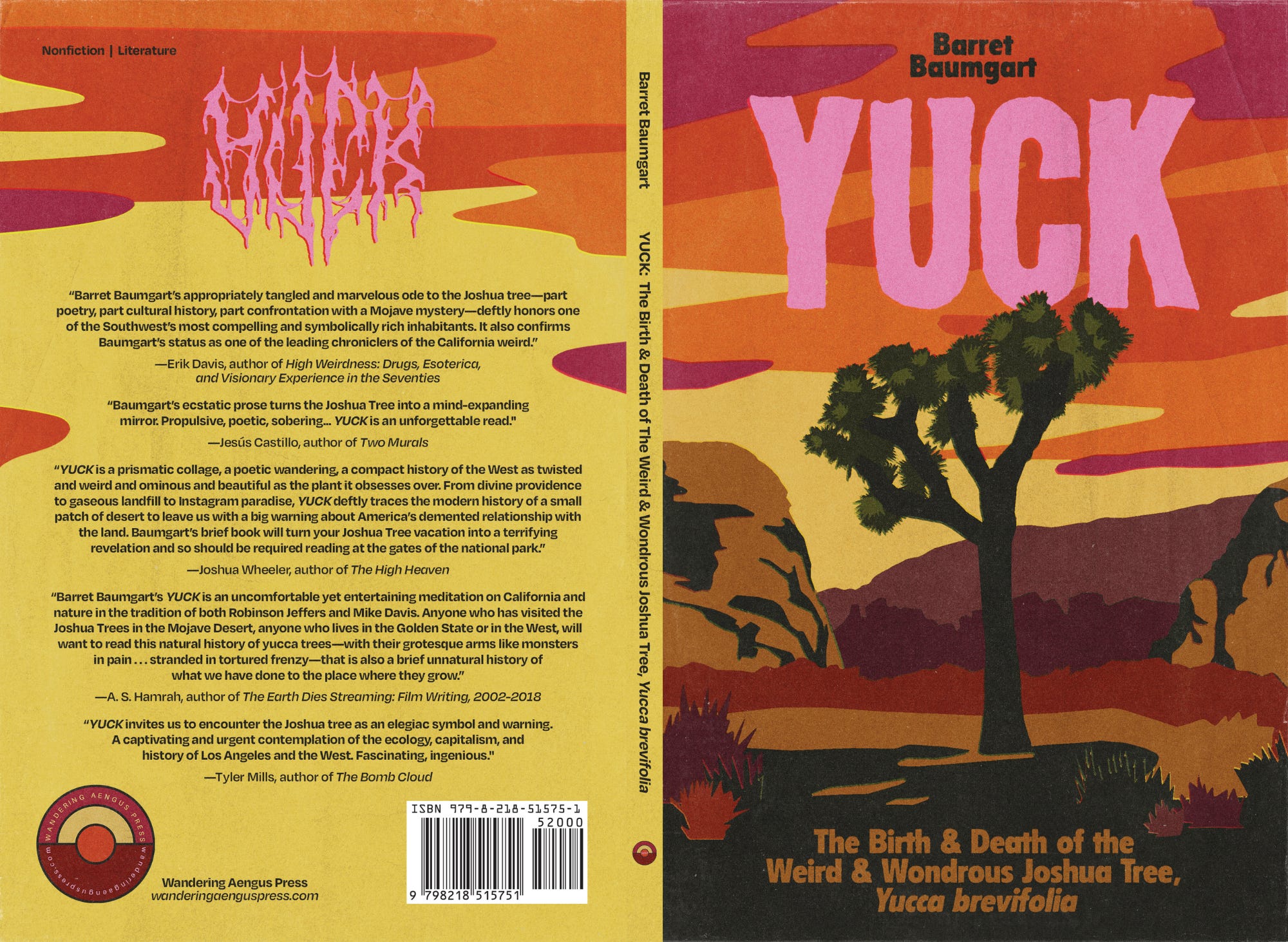
Ugh that wedding post card is so cool! Ironically Joshua Tree would be a great place to elope too.